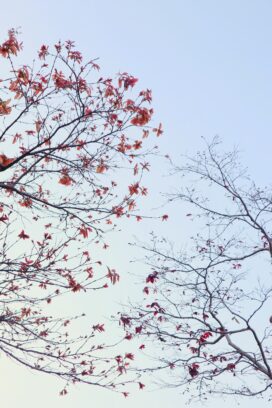You have no items in your cart. Want to get some nice things?
Go shopping2 minute read.

We don’t do seasons round these parts.
In these parts, Julian, Dick and Ann, plus George and Timmy the dog—Enid Blyton’s famous five—brought autumn to us, as they traversed rugged coastal terrain wearing warm woolen cardigans, infiltrated customs evaders’ workplaces while the sun set sooner, and sent clever Timothy through holes in caves to get adult supervisors to come save them, before it got too chilly. After that, we took a bus to the local public library, queued to return this famous quintet for our complement of four library cards, and queued to let the Bobbsey twins, Miss Drew and Masters Hardy in turn take us through sidewalks and forests in fall, as they tussled and tangoed with dastardly perpetrators and crooks. When color television arrived on the scene, imagination from text took a break—a permanent backseat for some—and new imagination from vivid moving pictures took off. Charlie Brown and friends (were they really called the Pumpkin Patch?), with Linus’ inscrutable The Great Pumpkin looming behind the scene, were a defining moment for fall appreciation, and some of us had urgent questions. What are pumpkins, why are they a thing, and what is the deal with fall and Halloween?
Fall. Autumn. Qiu Tian. For the record we never got answers. DARPA was still working on the internet. The teachable moment was a missed opportunity. With low to no disposable household cash, road trips to a neighboring country were the greatest adventure, never mind the identical climate. Air travel near or far was a human impossibility, a luxury beyond the reach of any except the stratospherically wealthy. Real fall, and real seasons, would have to wait until growth and incomes levelled up. Meanwhile Walden Pond, and the road not taken, welcomed us as repeat visitors.
In these parts, we do hot, or we do wet, and often we do hot and wet in the same day. The equatorial belt is also the belt of calm, meaning no winds while the sun air-fries this zone all year round. As our science and geography teachers would drill into us, hot air convects upwards along with evaporated moisture, the latter’s joyride ending all too soon when it returns as rain. Transition for us is daily, our hours chopped into micro-seasons, minutes into nano-seasons. Change is continuous, and you forget your umbrella at your peril. Yet day to day, change that is internalized may become imperceptible.
This perennial, diurnal cycle is overlayed and complicated by two monsoon seasons annually. Again hot air rises, this time from the northern Asian land mass in summer, followed by giant whooshing sound as cooler sea air over the Indian Ocean muscles in, abhorring any potential vacuum. This is the Southwest Monsoon from June to September. The reverse Northeast Monsoon, from December to March, is triggered by the Asian winter as more of the relatively warmer air over the Indian Ocean rises. Giant whooshing sound the opposite direction, the same wet. The “inter-monsoon periods” could thus be analogous to fall and spring, although such analogy is reasoned interpolation and not effectively experienced. Surplus in Monsoon Asia occurs when an agriculturally perfect monsoon has helped to deliver a good harvest.
In these parts then, we mark time without fall, without seasons. We mark time by hot, wet and wetter (rinse, repeat), and hot again. Often we lose track of the wetness because it simply does not matter, although proprietors of car wash establishments may beg to differ. With heat-exchange tech that has been the same for years, we inadvertently, nay, consciously blunt the impact of weather on body and psyche, sideline the cues of nature. On the horizon, large-scale district cooling tech promises greener, more planet-friendly infrastructure, centralizing and optimizing air-conditioning resources across multiple buildings. So we embrace time more intellectually, with festival dates, school terms and graduation rituals, while we do cool and sheltered from hot and wet.
As metaphors transport ideas, there too are seasons and tides to people. Having recently traversed half a century, and even assuming a generous denominator for longevity, I have undeniably crossed over to my personal autumn. I had indeed lucked out subsequently and lived two glorious years of my spring in Boston—New England abstracted into Thoreauland one dawn in Fall, green crowns of elegant trees turned flame-red and gold, solitary boat in the still of the lake.
Fall is the well-trodden path, sheltered by lush jade coats incandescent, arboreal phoenixes aflight. It is the arriving cars and trucks of excitable families, it is risking one last boat outing before the cold sets in for the year. Fall is the exhilarating drive across open country, navigated with startup du jour MapQuest printed on the back of recycled postgrad lecture notes. It is apples plucked in excess, baked into infinite pies.
Fall is also being in wistful denial after moving on from Boston, remembering autumnal experiences with a chuckle and never dipping into real withdrawal. And concurrently the private Fall within, my self-postponement of writing the past three decades for a guarantee of stabilizing family finances, this clash of humility and hope and arrogance and gratitude and hunger and raging against and whatitcouldhavebeen and whatitcanstillbe.
As a new Fall approaches, there is enjoyment and anticipation; there is respect and resolve. That we can, that we will in this season craft the winter that is to come, design a future of our own, and create every mark in our own time.
*
Ping-Yi Yee
Ping Yi works in public service, and writes fiction, travelogues and poetry. His work has appeared in Litro, London Grip, Meniscus and Defenestration, and is forthcoming in La Piccioletta Barca and Dreich. Ping Yi is from Singapore, and has also lived in Boston, and Cambridge, UK.




